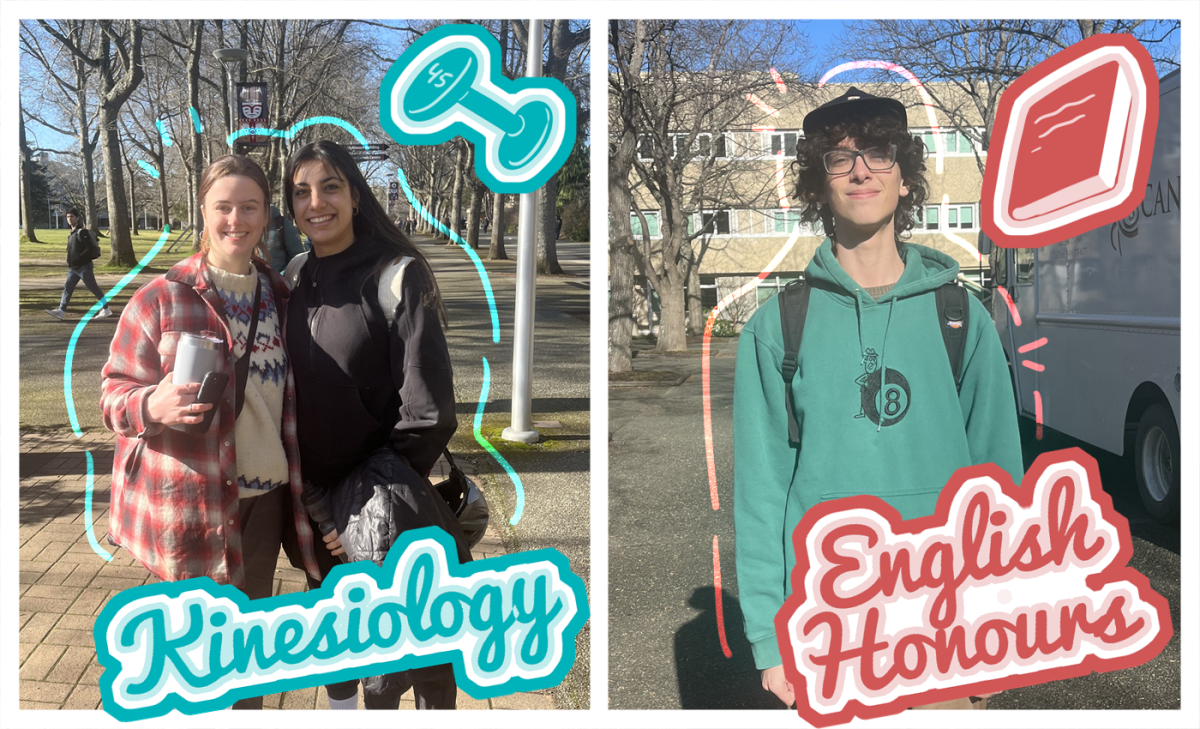I asked students on campus what they’re studying and why

Emily, Mariana, and Alexander; Graphic by Sie Douglas-Fish, photos by Sajjan Sarai.
As a university student, you learn to expect the pattern of questions that ensue when someone attempts to make small talk. Usually, it goes something along the lines of, “What do you do?” “I go to UVic.” “Oh, what do you study?”
Despite the mundanity of this conversation, it’s a good question. What do UVic students study? And more importantly, why do they study it and how passionate are they about it?
After talking to several random students on campus about this, there were some trends that arose. I didn’t encounter many first-years, but the ones that I did were all eager to be studying their major. Second-years seemed to be in various different places, with most still pursuing the same degree they did in year one, or undeclared and still deciding. Third, fourth, and fifth-years were even more varied, some having switched majors halfway through their degrees, and others sticking it out the entire way to graduation.
But university looks different for everyone. Here’s what some students had to say about their degrees.
Lucy, a fourth-year student doing an applied linguistics major with a French minor, said she was “originally doing a double major with French and applied linguistics, but … just dropped it down to a major/minor because it was too much.” When I asked if she was passionate about it, Lucy said, “I really am. I really like teaching, and applied linguistics is centred around second language instructions.”
This is similar to Emily, a fifth-year student who is passionate about physics because she wants to teach it as a career. Emily ended up landing on physics after studying physics astronomy, and math to start her post-secondary education.
Samuel, a second-year biology student, got into biology in high school. This was likely due to his parents both having master’s degrees in scientific areas, but he also said that it was “what [he] felt like he wanted to do.” While he hasn’t quite decided on what he wants to do after graduation, he hopes for something related to sports or physiotherapy, which he is very much passionate about.
Alexander is a second-year English honours student minoring in history (which he switched into from professional writing). He’s taking English because he felt that “the B.C. school curriculum kind of failed a lot of people who were neurodivergent in learning math and science, and [he] was always really good at reading and enjoyed studying literature.” Even though he felt cornered into taking it, Alexander likes the research aspect and the path towards faculty that English has and feels passionate about his studies.
As for fifth-year kinesiology students Emily and Mariana, who are both graduating this April, genuine interest in their areas of study was also obvious. After starting out as a biochem major, Mariana switched to kinesiology after two years because it allowed her a deeper understanding of physical health and wellness of the body. Emily had similar reasons and enjoys learning about exercise and nutrition to understand how healthy living and activity can prevent disease later in life.
Geronimo is a fourth-year geography major. He initially chose geography because he enjoyed human geography, but has begun enjoying physical geography as a result of his degree. He’s passionate about geography, but doesn’t know what he will do with it quite yet.
Kaley is a second-year undeclared student deciding between biology or biopsych, with the goal of attending dental school afterwards. She said she’s passionate about science but not specifically biology, though she believes biology will be the best undergrad degree to go into dental school.
From these interactions, it’s clear that areas of interest and pursuit evolve as students move through their studies. Sometimes high school experiences, parents, or the prospective job market influence our choices for post-secondary education. Interestingly, many of the people I talked to were interested in teaching. Although quite a few were unsure of what they wanted to do after graduation, most had a general plan, and some really had no idea. Lots of people also change their majors, which shows that there often is space to switch gears if you’re unhappy, or find a new passion.
Whether it’s surprising or not, passion was often the reason why students on the UVic campus are doing what they are doing. It seems that people on campus don’t tend to value the high-paying degrees or jobs over the fulfillment they get from doing something they enjoy.






